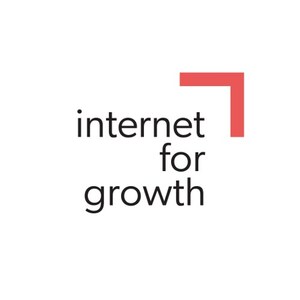
How U.S. Voters View Digital Tools, Innovation, and the Risks of Regulation
Survey finds 94% of voters say digital tools are vital for Main Street; majorities fear new taxes and regulations will raise costs, shutter businesses, and reduce consumer choice
WASHINGTON, Nov. 12, 2025 /PRNewswire/ -- Voters across parties are sounding a clear alarm: digital tools such as online advertising and social media aren't just conveniences—they're survival tools for Main Street. A new national survey commissioned by Internet for Growth, a nationwide coalition of small businesses, entrepreneurs, and digital creators, finds overwhelming agreement that taxes and regulations aimed at "Big Tech" would hit small businesses hardest—driving up costs, shrinking opportunity, and even threatening survival.
"As election season heats up, voters are focused on affordability — and they know that limits on digital advertising would raise prices and hurt opportunity," said Brendan Thomas, executive director of Internet for Growth. "Nearly 40% have run small businesses themselves, or say that if they were starting one, online platforms would be the first place they'd turn. The findings flip the usual story: Americans are far more positive about how technology supports local economies than many polls suggest — and policymakers risk misjudging public sentiment and drifting away from voter priorities."
The survey, conducted by Echelon Insights from September 5–7, 2025, among 1,030 likely voters nationwide (margin of error ±3.4), reveals striking bipartisan consensus: voters believe digital tools are essential to small business survival, local commerce, and consumer choice.
Among American voters:
- 94% say digital tools are vital for small business survival.
- 87% say regulations aimed at "Big Tech" could also affect small businesses.
- 85% say restricting digital ads would reduce access to free online content and services.
- Across parties—78% of Democrats, 75% of Republicans, and 82% of Independents—oppose new regulations that could make digital advertising more expensive or difficult for small businesses.
- A majority (53%) would be less likely to vote for candidates supporting new digital regulations, while just 9% would be more likely.
Voters also reject policies that would dismantle ad-supported platforms, restrict personalized advertising, or impose new digital taxes—moves they see as harmful to creators, consumers, and small businesses alike.
"Voters continue to express deep concern over cost of living," said Kristen Soltis Anderson, Co-founder of Echelon Insights. "They believe that digital tools play an important role in their communities and the small businesses they love, and understand that making digital tools more expensive can hit their own pocketbooks at a time when they can least afford it."
Digital Tools That Power Main Street
From payments to promotion, digital tools are now the backbone of Main Street operations—and voters understand their value. Discovery has shifted decisively online, with social media, e-commerce, and mobile apps eclipsing traditional advertising. Generational patterns vary, but the consensus is clear: digital tools are indispensable to how small businesses reach customers and how consumers discover what's next.
- 90% say nearly every business depends on digital tools such as online advertising to succeed.
- 84% say digital tools make it easier for small businesses to accept payments.
- 78% say digital tools help small businesses reach new customers.
- 67% say social media is essential for local businesses.
- 39% say they discover small businesses most often on social media, and 18% through search.
- 91% say personalized ads help them find local businesses they like.
- 78% say they would promote a new business online first.
"I run a local marketing firm that helps small businesses advertise online," said Drew Ament, owner of Press1toTalk in Phoenix and an Internet for Growth leader. "For most of my clients — from auto dealers to restaurants — digital advertising is the only affordable option. It helps us compete with larger companies by reaching the right audiences efficiently and effectively. But new limits on data, ad taxes, and other restrictions would raise costs and weaken the online experience. We're asking elected leaders to stop targeting the tools small businesses depend on."
Voters Worry About Rising Costs and Hidden Consequences
Voters see regulation not as an abstract policy debate but as a kitchen-table issue that affects household budgets and local jobs. They believe new taxes and rules could drive up costs, limit access to free online content, and make digital tools harder to manage for small businesses.
- 83% say increased regulation of digital tools would harm small businesses.
- 77% say increased regulation would harm consumers.
- 89% say they would be concerned if small businesses had to cut back or close because of higher advertising costs.
- 89% say digital tools and ads work best when they work together—disrupting these networks would harm small businesses, publishers, and creators.
- 57% favor one consistent federal rulebook over a patchwork of state laws.
What Voters Want Policymakers to Understand
Voters see digital policy as an economic issue, not a tech debate. It's also one of the few issues uniting Americans across party lines. Voters of all backgrounds oppose new digital taxes and regulations that would raise costs for small businesses, limit access to affordable advertising tools, or disrupt the ad-supported internet. The message to policymakers is clear: these proposals are unpopular, and the political risk is real.
- 78% of voters—majorities across every party and every tested demographic group—oppose new digital advertising taxes and regulations that would raise the cost of digital tools for small businesses.
- 54% of Democrats and 49% of Republicans say they would be less likely to support a member of Congress who voted to increase regulation of digital tools.
- Among Independents, 59% say they would be less likely to back candidates supporting additional regulation.
- Trump and Harris voters show near-identical levels of opposition, underscoring rare bipartisan unity on this issue.
In a polarized era, few issues inspire this kind of agreement. For voters, digital policy goes far beyond Silicon Valley—it's about keeping Main Street competitive, creative, and connected. Americans overwhelmingly want Washington to protect the affordable, ad-supported internet that fuels small-business growth, innovation, and jobs in every community. Congress and state leaders now face a clear choice: preserve the digital tools that power opportunity—or risk policies that raise costs, limit access, and slow local growth.
About Internet for Growth
Internet for Growth is a nationwide coalition of small businesses, entrepreneurs, creators, and digital professionals advocating to keep the internet open, affordable, and ad-supported. The coalition highlights how digital advertising, media, and marketing fuel local economies, jobs, and innovation. By amplifying the voices of small businesses and creators, Internet for Growth works to preserve the data-driven tools that help millions of businesses reach customers, compete online, and power growth in every state and community.
About Echelon Insights
Echelon Insights is a research and analytics firm that helps organizations understand public opinion, voter behavior, and market trends. Founded in 2014, the firm specializes in survey research, data modeling, and advanced analytics to inform strategy for businesses, policymakers, and advocacy groups. Its work spans political campaigns, issue advocacy, and corporate strategy, with a focus on delivering insights that are both rigorous and actionable.
SOURCE Internet for Growth







Share this article